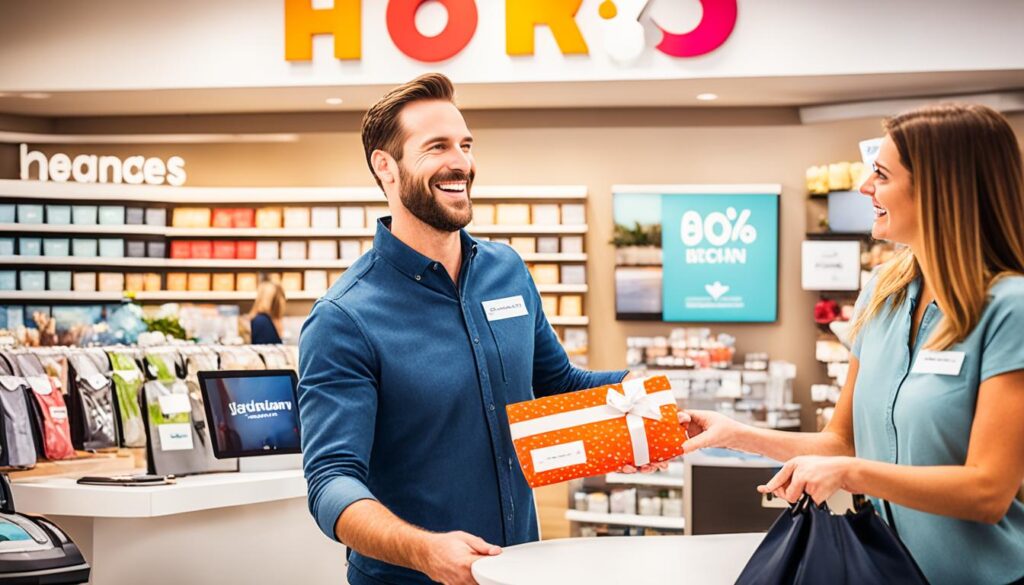Did you know that 54% of consumers expect personalized experiences when interacting with businesses? And that over 90% of customers are more likely to spend money with companies that offer personalization? Personalized customer service is not just a nice-to-have, it is a must-have in today’s competitive market. But how can you effectively personalize customer service to enhance customer satisfaction and engagement?
In this article, we will explore the key strategies and techniques to provide personalized customer service. From tailoring the customer experience based on unique attributes and preferences to using a customer-centric approach and leveraging technology, we will cover it all. Discover how personalization can improve customer loyalty, drive sales, and create a customized customer experience tailored to each individual.
Why Personalized Customer Service is Important
Personalized customer service plays a crucial role in the success of businesses today. By tailoring the customer experience and meeting individual needs, businesses can build deeper relationships with their customers and demonstrate how much they value them as individuals. This personalized approach to customer service has numerous benefits, including increased customer satisfaction, improved customer loyalty, and ultimately, better sales and profitability.
Studies have consistently shown that personalized customer service leads to higher levels of customer satisfaction. When customers feel that a business understands and caters to their unique preferences and needs, they are more likely to be satisfied with their overall experience. Satisfied customers are also more likely to become loyal customers, returning for repeat purchases and recommending the business to others. This increased customer loyalty can have a significant positive impact on a business’s bottom line.
A key benefit of personalized customer service is its ability to drive improved sales and profitability. When customers feel valued and receive personalized attention, they are more likely to make additional purchases and spend more money with the business. In fact, research has shown that businesses that implement personalization strategies in their customer service experience an increase in their online conversion rate by approximately 8%. This means that personalized experiences can directly contribute to the financial success of a business.
By offering personalized customer service, businesses can also enhance the online conversion rate. When customers receive a customized and tailored experience, they are more likely to complete their purchases and convert into paying customers. This is particularly important in the digital age, where online shopping is increasingly popular. The ability to provide personalized support throughout the online customer journey can significantly impact the conversion rate and drive business growth.
Through the use of advanced customer data analytics and personalized communication strategies, personalized customer service can create unique experiences that meet the specific needs and preferences of each individual customer. This level of personalization helps businesses stand out from their competition and fosters long-term customer relationships based on trust and loyalty.
Personalized customer service is not just a nice-to-have feature; it is an essential part of customer service for businesses that want to keep their customers happy, retain their business, and drive their overall success.
| Benefits of Personalized Customer Service |
|---|
| Increased customer satisfaction |
| Improved customer loyalty |
| Higher sales and profitability |
| Enhanced online conversion rate |
How to Provide Personalized Customer Service
When it comes to providing personalized customer service, there are several effective strategies you can implement to meet the unique needs and preferences of your customers. By tailoring your approach and utilizing technology, you can create an exceptional customer experience that fosters loyalty and satisfaction.
1. Learn and Use Customers’ Names
A simple but impactful way to personalize customer service is by learning and using your customers’ names. Addressing them by name shows that you value them as individuals and helps create a more personalized connection.
2. Be Friendly and Human
Customers appreciate a friendly and human touch in their interactions with businesses. Train your support representatives to engage with customers in a warm and welcoming manner, making them feel valued and understood.
3. Collect and Leverage Customer Data
Collecting and leveraging customer data is key to personalizing your service. Use data analytics to gain insights into customer preferences, purchase history, and other relevant information. This allows you to tailor your offerings and recommendations to each customer’s unique needs.
4. Offer Custom and Unique Solutions
To personalize customer service, go beyond cookie-cutter solutions. Take the time to understand each customer’s specific requirements and offer customized solutions that address their individual needs. This demonstrates that you are invested in finding the best solution for them.
5. Get to Know Customers on a Personal Level
Building a personal connection with your customers is important for delivering personalized service. Take the opportunity to get to know them on a personal level by learning their interests, preferences, and even their challenges. This information will help you tailor your interactions and offerings accordingly.

6. Provide a VIP Experience
Recognize and reward your loyal customers by providing them with a VIP experience. Offer exclusive perks, discounts, or personalized recommendations to make them feel valued and appreciated. This personal touch goes a long way in building customer loyalty.
7. Use Technology
Integrate technology into your customer service processes to enhance personalization. Use customer relationship management (CRM) systems, chatbots, and other automated tools to track interactions, provide personalized recommendations, and deliver efficient support.
8. Train and Empower Support Reps
Invest in training your support representatives to deliver personalized service effectively. Equip them with the necessary knowledge and tools to understand and address customer needs. Empower them to make decisions and go the extra mile in providing exceptional service.
9. Create a Seamless Omni-channel Experience
Today’s customers expect a seamless experience across multiple channels. Ensure consistency and personalization across your website, mobile app, social media platforms, and in-store interactions. This helps create a cohesive customer journey and reinforces your commitment to personalized service.
10. Get Customer Feedback
Continuous improvement is essential in providing personalized customer service. Actively seek feedback from your customers to understand their preferences, pain points, and areas for improvement. Use this feedback to refine and enhance your personalized service strategies.
Personalized Customer Service Examples
When it comes to providing exceptional personalized customer service, there are a few standout examples that come to mind. Brands like Amazon, Zappos, and Starbucks have become renowned for their ability to tailor the customer experience and build strong relationships with their customers.

Amazon employs customer data to deliver personalized product recommendations, ensuring that customers are shown items that align with their preferences. Additionally, they send targeted emails with special offers, creating a more engaging and individualized shopping experience.
Zappos goes above and beyond to get to know their customers on a personal level. By capturing relevant information during interactions, they tailor their communications to match customer preferences, ensuring that each interaction feels personalized and meaningful.
Starbucks, known for its commitment to customer satisfaction, utilizes technology such as chatbots to provide personalized support. These chatbots are utilized to answer common customer questions and address specific concerns, offering convenience and customized assistance.
Personalized Customer Service Examples
The following table highlights the personalized customer service approaches taken by Amazon, Zappos, and Starbucks:
| Brand | Approach |
|---|---|
| Amazon | Utilizes customer data to provide personalized product recommendations and targeted emails with special offers. |
| Zappos | Takes the time to understand customers on a personal level and tailors communications based on captured information. |
| Starbucks | Uses technology, such as chatbots, to provide personalized support and answer common customer questions. |
These brands serve as prime examples of how personalized customer service can lead to strong customer relationships and increased loyalty. By understanding their customers’ preferences and delivering customized experiences, they create a sense of value and build lasting connections.
Why Customers Expect Personalized Service
Customers now have higher expectations for personalized service due to the increasing demand for personalized customer experiences. In today’s competitive market, businesses that can tailor their services to meet individual customer needs are more likely to succeed in building strong customer relationships and loyalty.
According to surveys, customers are more willing to share personal data with companies if it leads to an improved customer experience. This shift in attitude reflects a growing comfort with data collection and a recognition of the benefits that personalization can bring.
By sharing personal data, customers allow businesses to gain valuable insights into their preferences, behaviors, and needs. This data enables businesses to provide more relevant and customized interactions, offering products, services, and support that are tailored to the individual customer’s preferences.
“Customers appreciate it when businesses take the time to understand their unique needs and provide personalized solutions. It makes them feel valued and appreciated by the brand, leading to increased satisfaction and loyalty.”
Personalization benefits customers in several ways. Firstly, it ensures that they receive more relevant recommendations and offers, saving them time and effort in searching for products or services that meet their specific requirements. Secondly, personalized customer service creates a sense of connection and appreciation, making customers feel valued as individuals. This, in turn, fosters a positive emotional connection with the brand and increases customer loyalty.
Furthermore, personalization allows businesses to anticipate customer needs and provide proactive support. For example, if a customer regularly purchases a specific product, the business can proactively notify them of promotions or warranties related to that item, enhancing the overall customer experience.
Ultimately, personalized customer service enhances the overall customer experience by catering to individual preferences and needs. By investing in personalization strategies, businesses can differentiate themselves from their competitors and build long-lasting relationships with their customers.
Customer Expectations and Comfort with Data Collection
In the age of technology and data-driven marketing, customers are becoming more familiar and comfortable with the idea of sharing personal data. They understand that by providing access to their data, they are enabling businesses to deliver enhanced personalized experiences.
Customers have come to expect that businesses will use their data to better understand their needs and deliver more relevant and personalized interactions. They understand the trade-off between sharing personal data and receiving customized experiences that meet their expectations.
However, it is essential for businesses to be transparent and responsible when collecting and using customer data. Establishing trust with customers is crucial. Clear communication about data privacy and security measures can help alleviate concerns and ensure that customers feel confident in sharing their information.

Benefits of Personalization
The benefits of personalization go beyond enhancing the customer experience. Businesses that effectively personalize their customer service can gain a competitive edge, drive customer loyalty, and achieve business growth.
Some of the key benefits of personalization include:
- Improved customer satisfaction: Personalization ensures that customers receive exactly what they need, resulting in higher satisfaction levels.
- Increase in customer loyalty: When customers feel valued and understood, they are more likely to remain loyal to the brand and make repeat purchases.
- Greater customer engagement: Personalization creates a deeper connection with customers, leading to increased engagement and interaction with the brand.
- Higher conversion rates: By delivering personalized experiences that perfectly match customer preferences, businesses can boost conversion rates and improve overall sales performance.
- Enhanced customer lifetime value: Personalization helps businesses strengthen relationships with customers, leading to increased customer loyalty and a longer customer lifetime value.
Overall, personalized customer service has become a necessity in today’s customer-centric market. By delivering tailored experiences that meet customer expectations and leveraging customer data responsibly, businesses can create a strong competitive advantage and achieve long-term success.
Benefits of Personalized Customer Service
Personalized customer service offers numerous benefits for both customers and businesses. By utilizing customer data, businesses can provide faster and more convenient customer experiences, meeting the high expectations of today’s customers, particularly in the online shopping era. Moreover, personalized customer service contributes to driving customer loyalty as it makes customers feel valued and appreciated, ultimately leading to repeat business and positive word-of-mouth recommendations.
The Benefits of Personalized Customer Service
1. Faster and More Convenient Customer Experience: By leveraging customer data, businesses can anticipate customer needs and provide relevant support, resulting in faster and more convenient customer experiences. This level of personalization saves customers time and effort by delivering tailored solutions and assistance.
“Personalized customer service allows businesses to anticipate customer needs, resulting in faster and more convenient experiences.”
2. Meeting Customer Expectations: In today’s digital age, customers have high expectations when it comes to personalized service. By offering customized experiences, businesses can meet these expectations and ensure customer satisfaction. When customers feel that their needs and preferences are understood and addressed, they are more likely to be satisfied with the service they receive.
3. Driving Customer Loyalty: Personalized customer service plays a crucial role in building customer loyalty. When customers receive personalized attention and support, they feel valued and appreciated by the business. This positive experience encourages repeat business and fosters a sense of loyalty and trust towards the brand.
“Personalized customer service makes customers feel valued, driving customer loyalty and repeat business.”
Examples of Personalized Customer Service:
To further illustrate the benefits of personalized customer service, let’s take a look at some real-life examples:
| Brand | Personalization Strategy |
|---|---|
| Amazon | Utilizes customer data to make personalized product recommendations and send targeted emails with special offers. |
| Zappos | Takes the time to get to know customers on a personal level and tailors their communications based on captured information. |
| Starbucks | Uses technology, such as chatbots, to answer common customer questions and provide personalized support. |
These examples demonstrate how personalization can build strong customer relationships and loyalty.
Overall, personalized customer service offers significant advantages in delivering faster and more convenient experiences, meeting customer expectations, and driving customer loyalty. By embracing personalization strategies, businesses can create meaningful connections with their customers, resulting in enhanced satisfaction and long-term success.
Conclusion
Personalizing customer service is a crucial aspect for businesses that aim to enhance customer satisfaction, improve customer loyalty, and meet the ever-increasing expectations of their valued customers. By leveraging customer data, offering customized solutions, and implementing personalized support strategies, businesses can create unique and tailored experiences that make customers feel truly valued and appreciated. Investing in personalization not only benefits individual customer interactions but also contributes to long-term business success.
Personalized customer service plays a significant role in enhancing customer satisfaction. By understanding the unique attributes and preferences of each customer, businesses can provide tailored experiences that meet their specific needs, ensuring a higher level of customer happiness and loyalty. When customers receive personalized attention and feel genuinely cared for, their overall satisfaction increases, fostering a positive relationship with the brand.
Another crucial aspect of personalization is its impact on improving customer loyalty. When a business goes the extra mile to understand and cater to each customer’s individual requirements, it creates a sense of connection and loyalty. Personalized customer service makes customers feel acknowledged and appreciated, enhancing their emotional connection with the brand and fostering long-term loyalty. Satisfied and loyal customers are more likely to repurchase, recommend the brand to others, and become brand advocates.
Meeting customer expectations is essential for thriving in today’s competitive business landscape. Personalized customer service allows businesses to exceed customer expectations by tailoring the customer experience to their unique preferences. By utilizing customer data to anticipate needs and provide relevant support, businesses can create fast, convenient, and enjoyable interactions that resonate with the customer’s requirements. This not only enhances customer satisfaction but also sets the brand apart from competitors, driving customer loyalty and ensuring continued success.
FAQ
How can I personalize customer service?
There are several ways to personalize customer service, including learning and using customers’ names, collecting and leveraging customer data, offering custom and unique solutions based on customer needs, and providing VIP experiences for loyal customers.
Why is personalized customer service important?
Personalized customer service allows businesses to build deeper relationships with customers, show that they value them as individuals, and meet their specific needs. It leads to increased customer satisfaction, loyalty, and improved sales.
How can I provide personalized customer service?
You can provide personalized customer service by being friendly and human in interactions, getting to know customers on a personal level by learning their interests and preferences, using technology to enhance customer service, and actively seeking customer feedback to improve personalized strategies.
What are some examples of personalized customer service?
Brands like Amazon, Zappos, and Starbucks excel in providing personalized customer service. Amazon uses customer data to make personalized product recommendations, Zappos tailors their communications based on captured information, and Starbucks uses technology to provide personalized support.
Why do customers expect personalized service?
Customers now have higher expectations for personalized service due to the increasing demand for personalized customer experiences. Surveys show that customers are more willing to share personal data with companies if it leads to an improved customer experience.
What are the benefits of personalized customer service?
Personalized customer service provides faster and more convenient customer experiences, meets the high expectations of customers, and drives customer loyalty by making customers feel valued and appreciated.
How does personalized customer service enhance customer satisfaction?
Personalized customer service enhances customer satisfaction by providing more relevant and customized interactions, which make customers feel valued and appreciated by the brand.
